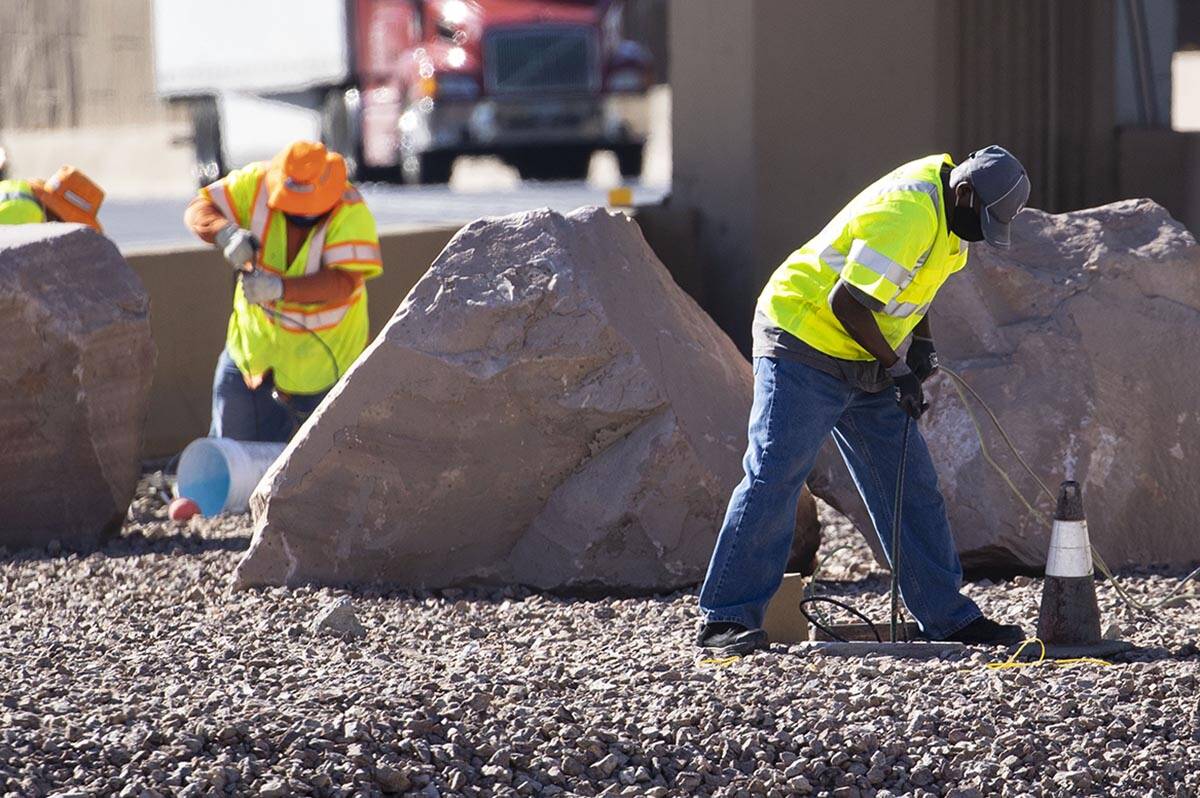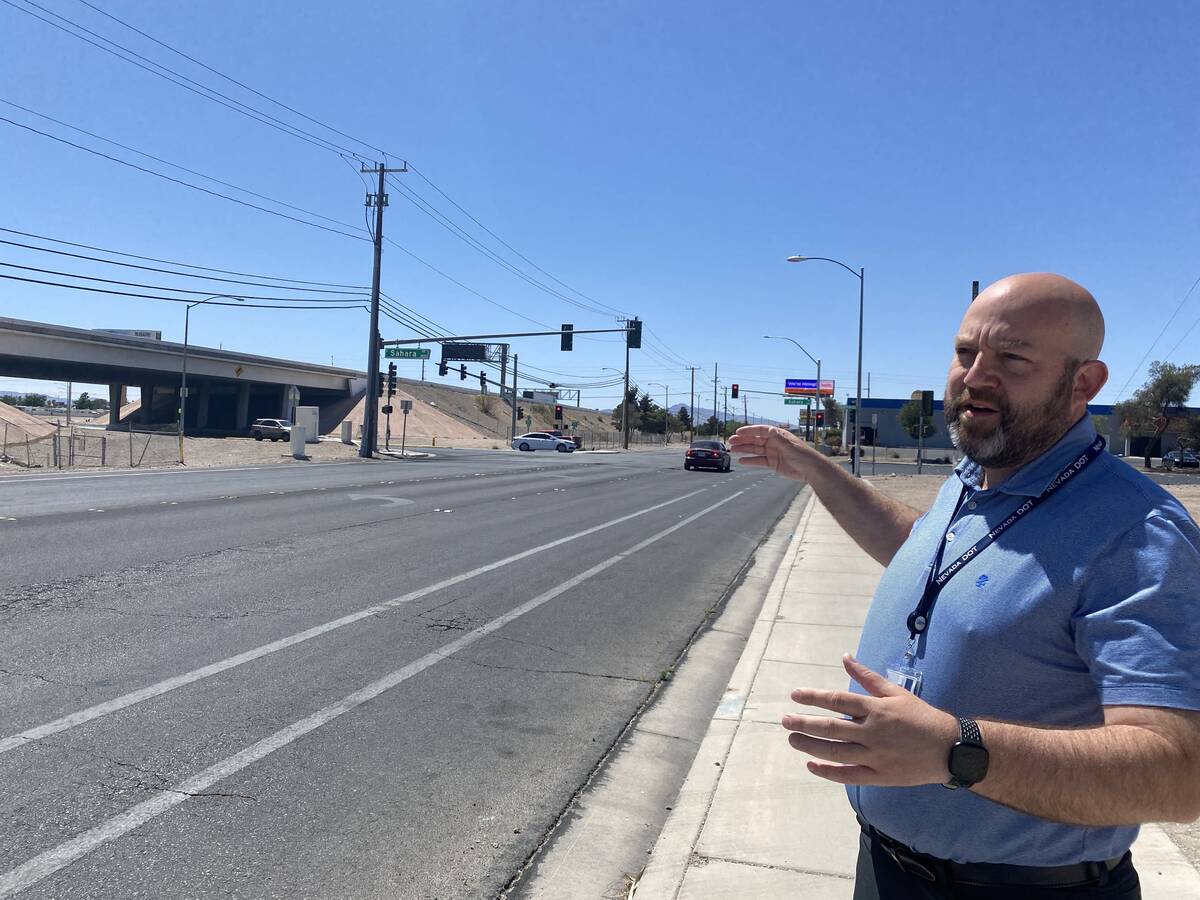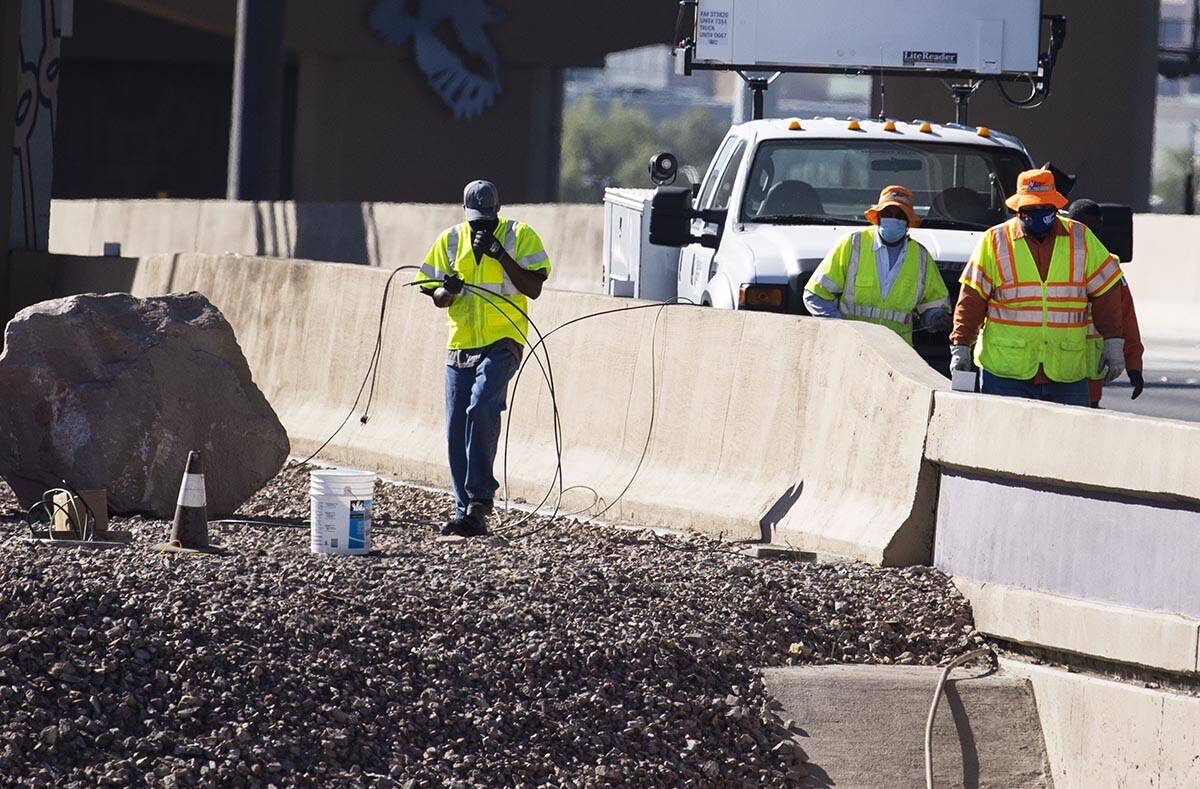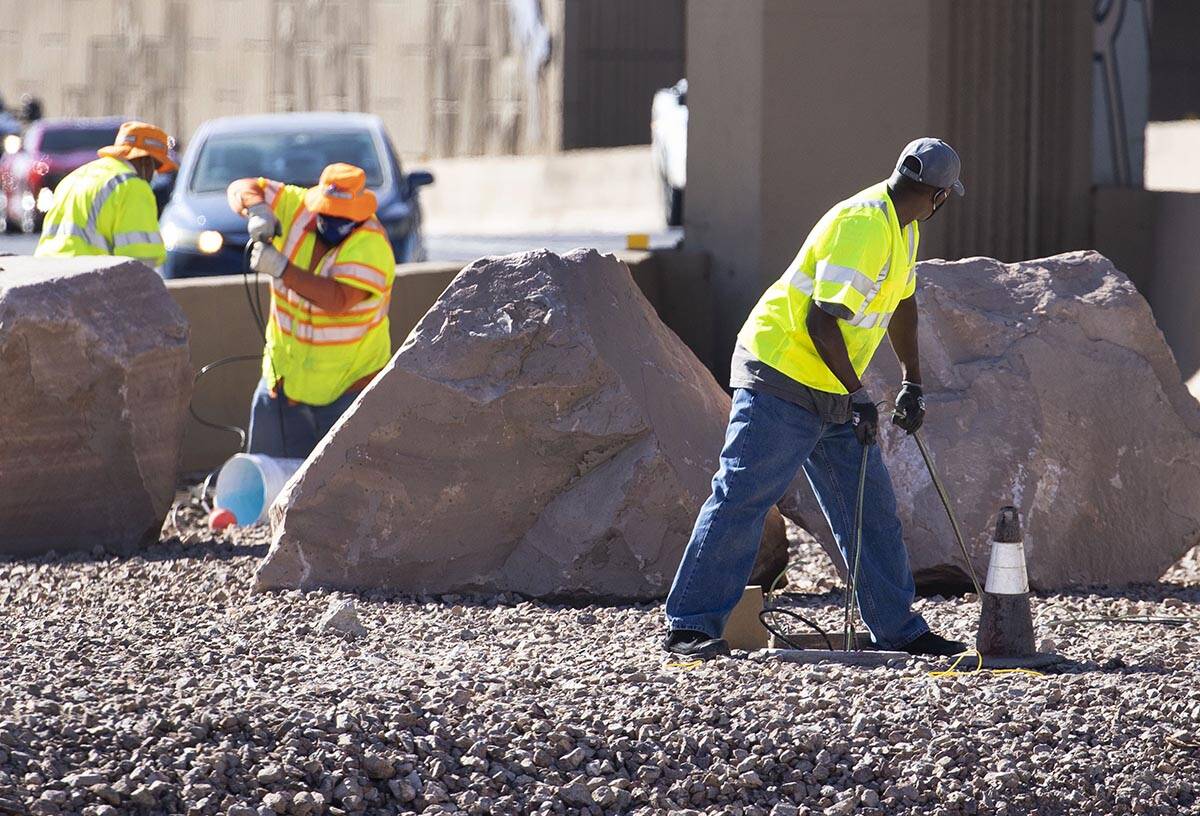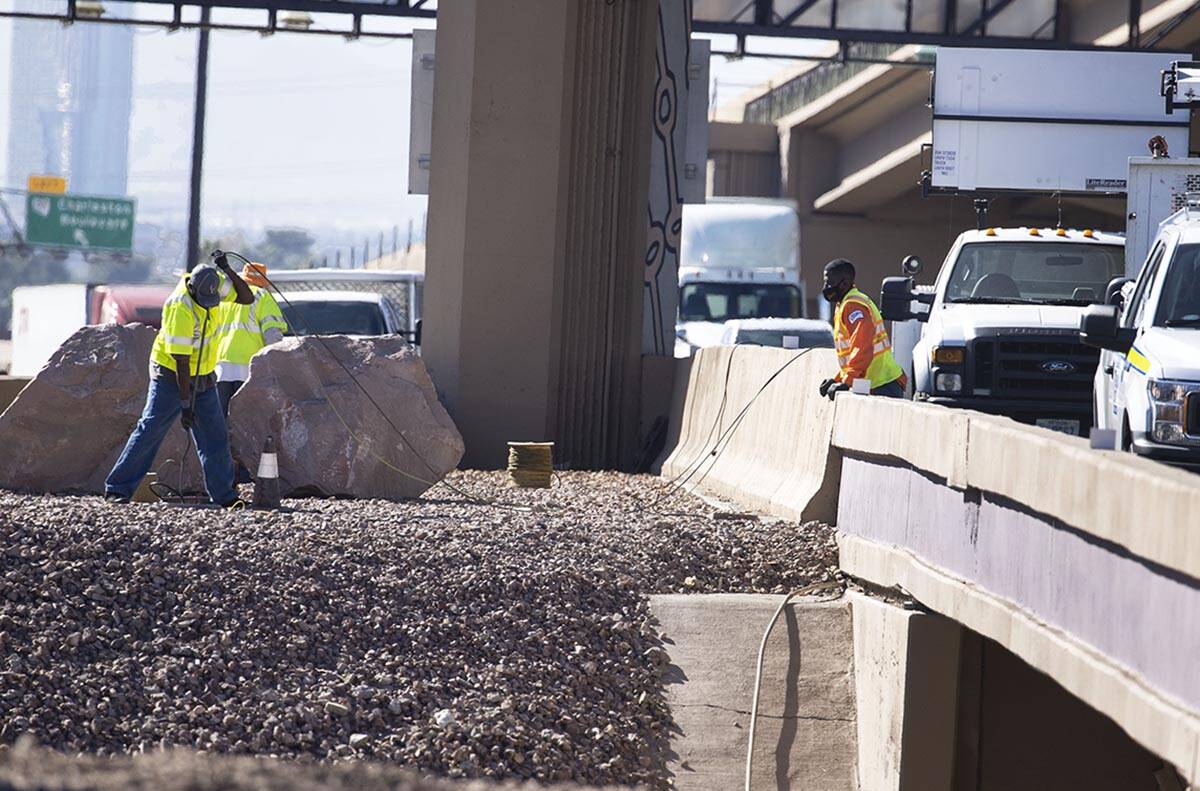Copper theft remains a red-hot problem in Southern Nevada
Nighttime drivers on U.S. Highway 95 in east Las Vegas may notice the road is a little darker than usual these days.
That’s because, from roughly the Charleston Boulevard curve to Boulder Highway, dozens of roadside lights operated by the Nevada Department of Transportation are out because of copper thieves.
“It came to our attention about a week ago,” department spokesman Justin Hopkins said Wednesday. “Some thieves got in and took out the infrastructure that’s associated with about 50 lights.”
Copper theft that damages public infrastructure has been happening in Southern Nevada for decades. This year, though, as the price of precious metals like copper has gotten red hot, the cases of copper theft is rising, according to the department, the city of Las Vegas, Clark County and the Regional Transportation Commission.
“We are seeing an upward spike,” said Danielle Waterfield, chief policy officer for the Institute of Scrap Recycling Industries in Washington, D.C. “The commodities are doing very well. You are also seeing high inflation, so people are starting to suffer. With that, you are seeing another spike.”
Costly crime
City of Las Vegas spokesman Jace Radke said in an email that from Feb. 1 to this week, the city has had 10 copper wire thefts from municipal infrastructure. Previously, the city averaged about 20 such thefts a year.
“The cost for labor and replacement materials to repair this infrastructure is about $30,000,” Radke said of this year’s thefts.
The Clark County Public Works Department recently identified some “50 locations where wire theft has occurred,” county spokesman Dan Kulin said.
“We have seen an increase in this problem over the last year, and it’s a problem throughout the valley,” he said.
The RTC said workers have put in more than 900 hours of staff time this year to make repairs to the commission’s traffic management system because of copper theft.
The Transportation Department said the cost of repairs for each instance ranges from $25,000 to $100,000, but costs can be much higher depending on the damage. The cost of a November 2020 fix of a lighting outage at the Spaghetti Bowl, caused by copper thieves, was approximately $300,000. In March, copper thieves also took out the overhead traffic signs on Interstate 15 as they searched for copper wire but ended up damaging fiber optic cables instead.
The costs are significant for private businesses, too. In Henderson, Progress Rail told police that a string of copper thefts at the railroad services business since January will cost nearly $800,000 to replace materials and make repairs.
Despite all of the expenses incurred — much of it by the taxpayer — police said no one keeps statistics on just how much copper theft is taking place in Southern Nevada. Instead, the theft is most often listed in crime statistics as property crimes or petty thefts.
Tough problem to dent
Police said deterring metal thieves is difficult. This is because thieves are often small-time criminals who steal small amounts, translating into lighter punishments when they are prosecuted.
And they aren’t just stealing copper. Police said there has been a huge increase in thefts of catalytic converters from vehicles with thieves seeking the precious metals in the equipment.
“From my experience, it’s mostly drug related, homeless subjects looking for quick cash,” North Las Vegas police spokesman Alexander Cuevas said of the copper theft.
Most of the theft happens at night and is rarely observed by witnesses, Cuevas said. Scrap yards that pay for copper face stringent requirements under Nevada law, he said, to document who they are purchasing copper from.
Some of those requirements include taking fingerprints from sellers, photographing the sellers and getting information about the vehicles they are driving. The scrap yards are not, however, required to report to police someone who is bringing in a lot of copper for sale.
“Another complication is that copper wire cannot be identified as belonging to a certain victim, no serial numbers, so even if someone is stopped with a large amount of wire, we cannot prove where it came from,” Cuevas said.
In other cases of copper theft, however, the crimes involve a complex operation. In the thefts at Progress Rail, Henderson police said they were carried out by a group of people who would take stolen copper bundles and wiring to a Las Vegas home, then used advanced machinery to strip out the wiring so they could sell it.
One of the suspects in the Progress Rail thefts sold more than 5,600 pounds of copper products to scrap yards for nearly $20,000 since January, police said in an arrest report in the case. A second suspect sold more than 7,200 pounds of copper for more than $18,000 at scrap yards since March, although there is no record in Henderson Justice Court of those two men being charged.
Henderson police declined comment on this story, saying the investigation is ongoing.
Going after sellers
Clark County District Attorney Steve Wolfson said more needs to be done to combat the theft. Under Nevada law, a scrap yard that knowingly purchases stolen copper can be prosecuted on a felony, but he said those cases are never brought to the district attorney’s office by law enforcement.
“I think we need to do more to deter not only the people who are stealing the copper wire, but perhaps the businesses that are purchasing the copper wire,” Wolfson said. “If I steal copper wire, I’ve got to sell it to somebody to get cash.
“There’s a crime called possession of stolen property and receiving stolen property. You know or should have known the property has been stolen.”
Waterfield and Todd Foreman, director of law enforcement outreach for the Institute of Scrap Recycling Industries, said the vast majority of recyclers do business the right way and do not purchase stolen metals. Nevada, meanwhile, has more stringent laws in place for the industry than most, citing the fingerprint requirement for scrap yard purchases as one example. Both said a small number of individuals who buy stolen copper end up giving the rest of the industry a black eye.
The institute is working to be a part of the solution, Foreman said, by creating an email and online alert system to notify law enforcement about significant theft. Key components to solving the problem, the institute said, are more stringent prosecutions of copper thieves and illicit purchasers along with basic theft-prevention techniques.
Las Vegas police spokesman Misael Parra said that if police learn a scrap yard is knowingly buying stolen property like copper, they will pursue the matter, but police also need recyclers’ help to catch thieves.



